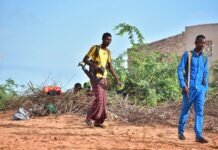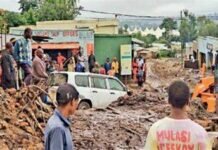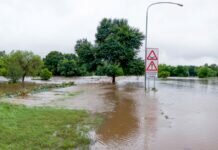Michel hid in the outdoor lavatory of his church in Kishishe, a town in eastern Democratic Republic of Congo, praying that M23 rebels wouldn’t find him.
That day, November 29, the rebels raided the town of thousands of people and committed their worst-recorded massacre since launching their campaign in late 2021.
Over 170 civilians were killed, according to the United Nations.
“They told them to sit on the edge of a hole, and they started shooting them,” said Michel, who witnessed the killings from his hiding place.
M23 rebels had captured Kishishe a week earlier, but they swept back into the town again that morning searching for Mai-Mai militiamen who attacked them and then hid inside houses, according to several residents.
Advancing to Kigoma
The M23 — which is allegedly backed by neighbouring Rwanda, something Kigali vehemently denies — has captured swathes of territory in eastern Congo’s North Kivu province and advanced within several dozen kilometres of its capital Goma.
Over 900,000 people have fled its advance, the International Organisation for Migration says.
The Tutsi-led militia has gained strategic toeholds across North Kivu, including lucrative border posts and control of most roads leading to Goma.
But its capture of Kishishe was resonant for another reason: the town had long been a bastion of the FDLR militia — a descendant of the Rwandan Hutu extremist groups that carried out the 1994 genocide against the Tutsi in Rwanda.
Withdrew from Kishishe
The M23 recently withdrew from Kishishe. AFP visited the town on April 5. All names of interviewees have been changed to protect their safety.
Residents described M23 fighters as launching a manhunt in Kishishe on November 29, going door-to-door and slaughtering any men or boys they found.
Michel, standing near a mass grave by the church where he had hidden, clasped his hands together as he recounted the attack.
Dozens of people had taken refuge in the church, explained Michel, but to no avail.
“They started killing everywhere,” the 40-year-old farmer said.
“They said every man who was there had to disappear from the Earth.”
Standing close by, another resident pointed to the top of a hill, where he said “there are more bodies”.
Bullet casings littered the ground on the hilltop, which had also had defensive trenches cut into the earth — and a freshly dug grave in a cassava patch.
“Four people are buried here,” said a farmer, pointing to the grave.
Stench of death
Along a path further on, several corpses were decomposing in the open air.
One man vomited from the overpowering smell. A small group of women and children returning from the fields passed by without looking, seemingly unfazed.
The corpses didn’t appear to have been there long, and it was not clear under what circumstances they were killed.
Fabrice, a resident of Kishishe, said that M23 rebels forced him to dig graves, but explained that the rebels had cremated some of their victims.
Witnessed killings
He said that he had witnessed 33 killings. The exact death toll in Kishishe remains unclear.
In February 2023, the UN put the figure at 171, but other estimates are lower. Amnesty International said that rebels killed at least 20 people.
A village elder told AFP that 120 deaths had occurred between November 22-29, producing a handwritten three-page list of names from his pocket.
“If they found a 14-year-old boy or a man, they killed them, even if they didn’t have a weapon,” he said.
Uncertain future
Another list detailing the death toll, circulating in Kishishe, contains only 18 names.
One witness said that this list was drawn up in December —under the eyes of M23 fighters — when three people who said they were journalists arrived from Rwanda. They later reported their findings in Rwandan media.
The DRC has repeatedly accused its neighbour Rwanda of backing the M23, a charge that Kigali denies.
The United States, several other western countries as well as independent UN experts have also concluded that Rwanda is backing the rebels.
Life has begun to return to the streets of Kishishe since the M23 left.
But the wounds of its occupation are still fresh, and an air of uncertainty hangs over its residents who have been left to fend for themselves.
Neither the Congolese army, UN peacekeepers nor soldiers from a joint East African military force deployed in the region have arrived to secure the town.
The M23 has withdrawn to a position 20 kilometres from Kishishe.
AFP











































